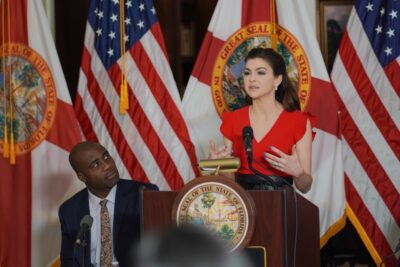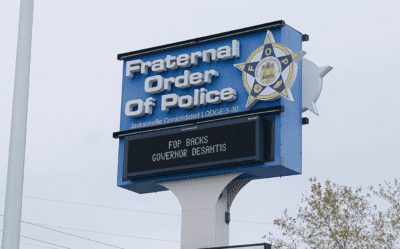
by Tom Scherberger, Florida Trident – March 7, 2024
As Hurricane Ian began its destructive tear through Southwest Florida to the Atlantic coast, Casey DeSantis issued a call for donations to the Florida Disaster Fund.
“I am pleased to announce that Volunteer Florida has activated the Florida Disaster Fund (FDF) so that people can donate directly to those affected by Hurricane Ian,” the wife of Gov. Ron DeSantis said in a September 28 press release.
Contributions soon poured in. Volunteer Florida, the state’s official private emergency fund, would raise a total of $63 million – nearly eight times the money raised after Hurricane Irma swept through the Florida peninsula in 2017.
Some of the biggest corporations in the state donated big bucks, including $5 million from Charles Schwab and $1 million each from Publix, Amazon, Florida Blue and HCA.

But where has that money gone? An investigation by the Florida Trident found that a once-rigorous competitive grant system, requiring proof of how donations are spent, was scrapped. Instead, the fund in those early months handed out millions of dollars in “expedited” grants to organizations with no explicit training or experience in emergency disaster relief – but with political ties to DeSantis.
One example is the Florida Restaurant & Lodging Association (FRLA), which received $3 million, the third largest single Florida Disaster Fund grant. The money went to the association’s Education Foundation, which has a stated purpose of supporting “sound educational experiences in preparation for dynamic and rewarding hospitality careers.”
After Hurricane Ian, the FRLA created its own makeshift disaster relief fund to help the hospitality industry recover through grants that required just one-third of the money went directly to employees. It’s unclear whether the Florida Disaster Fund grant was connected to this effort.
Politically, the Florida Restaurant & Lodging Association has openly expressed support for DeSantis and its PAC donates almost exclusively to Republican-oriented political groups. In 2022, the lodging and tourism businesses contributed $10 million to DeSantis, making it the second-most supportive industry for the governor, according to OpenSecrets, a non-profit group that tracks campaign money.
The Educational Foundation of The Florida Restaurant & Lodging Association did not respond to multiple requests for comment from the Florida Trident.
The FRLA payout is one of several opaque disbursals in a process that critics say has been irregular from the start. The state agency that manages the fund, Volunteer Florida, has traditionally used a competitive grant-making process to allot the money, with much of it going to local disaster relief organizations called long-term recovery groups (LTRGs). Traditionally, applicants were required to detail their projects and recipients provided documentation about how the state-directed money was spent.
But Volunteer Florida skipped the traditional grant-making process for Ian, according to a LTRG leader who spoke anonymously for fear of retribution. LTGRs were in fact left in the dark for months with little guidance on how to apply for grants, this official said.
Several months after Ian hit, local groups were sent an online survey in order to receive funding, and eventually 17 LTRGs across the state were awarded a spare $100,000 apiece. Soon after the Trident began questioning Volunteer Florida about the alleged neglect of LTRGs last August, an additional $2.3 million in belated payments was made to the long-term groups.
Volunteer Florida’s website includes a list of groups that received money and how much they received, but how the money was spent is explained only through some brief narrative accounts with little to no detail.
“There is no financial accountability and I’m not sure it’s not by design,” said the LTRG official. No detail is provided for how recipients spent the money, said the official, “other than what they said they did.” In contrast, grant-making organizations like the Red Cross require detailed reports, including receipts documenting every cent.
Volunteer Florida external affairs director Brittany Dover conceded that the previous bidding process, which was intended to make sure the donations went to the most worthy recipients, was abandoned for Hurricane Ian. Volunteer Florida chose instead to award “expedited” grants, she said, “in order to get much needed resources on the ground as quickly as possible.”
Volunteer Florida said it made 84% of its awards within the first six months after Ian, according to the Fort Myers News-Press. “Repeated requests … for more details on how grants were awarded went unanswered by Volunteer Florida,” the newspaper reported.
Such an opaque process undermines the organization’s credibility, one watchdog says.
“You want government agencies to have transparent processes to disburse money,” said Ben Wilcox, research director for Integrity Florida, a Tallahassee nonpartisan research institute and government watchdog. “The problem is when it’s not transparent and people can raise questions about things like favoritism in the process. It makes people lose trust in the process. Transparency has not been a real strong suit of the DeSantis administration.”
‘With a little help from our friends’
Initially receiving nearly as much as all long-term recovery groups combined were police organizations, all of which have endorsed Gov. DeSantis. The Florida Sheriffs Association along with charitable arms of both the Florida Police Benevolent Association and the Florida State Lodge Fraternal Order of Police each received $500,000, totaling $1.5 million.
The Florida Police Benevolent Association endorsed DeSantis for president, and previously endorsed his gubernatorial reelection. The state Fraternal Order of Police also endorsed DeSantis’ reelection, a reflection of the long term close relationship between the two. Neither the Florida Police Benevolent Association nor the Florida State Lodge FOP responded to requests for comment.

The Florida Sheriffs Association stands out for its particularly cozy relations with DeSantis, even though, as a 501(c)(3), it cannot participate in political activity or endorsements, a fact stated plainly on its own website.
Earlier this year, DeSantis delivered friendly remarks at a Florida Sheriffs Association conference in which he offered effusive praise and specifically boasted about how Florida Disaster Fund money was given to the association. According to a 2022 issue of the sheriffs association’s magazine, the funds were distributed to sheriff’s office employees.
“Our most recent challenge occurred on the southwest coast with the deadly and highly destructive Hurricane Ian,” Steve Casey, executive director of the Florida Sheriffs Association, wrote in the magazine. “And once again, the sheriffs delivered – with a little help from our friends.”
“You had all these folks – Coast Guard, state law enforcement, local law enforcement – out there helping,” DeSantis said during the conference. “But what we also understood was, ‘Yeah, that’s your job, but you were not necessarily immune from the effects from the hurricane.’
Logan Lewkow, director of communications for the Florida Sheriffs Association, said the Florida Disaster Fund donation helped “bridge the financial gap of impacted sheriffs’ office personnel who had major or complete devastation to their homes.” Lewkow said his organization was able to cut checks to employees within two weeks of the storm’s landfall.
The single largest disbursement, $23.4 million, went to the Florida Division of Emergency Management to fund the Sheltering in Home for Recovery Continuation (SHRC) program, run by the Florida Housing Coalition. In December the emergency management division reported its 500th home repaired after Hurricane Ian.
Hurricane relief dollars go for “spiritual transformation”
Another important part of DeSantis’ political base are evangelical Christians – and they got their share of hurricane recovery funding too.
The second highest FDF grant, $4 million, was paid to a faith-based non-profit organization, the Impact Foundation, founded by Jeff Johns, a former National Christian Foundation executive. The Impact Foundation engages in “faith driven impact investing” to create “economic, social and spiritual transformation,” according to the foundation’s website.
Detailed information about the Impact Foundation isn’t easy to come by and emails to the organization did not receive a response. According to an internal Volunteer Florida email, the money given to the Impact Foundation was used to support small business rebuilding. It’s not clear whether the organization has a history of post-disaster recovery work, and the email did not provide details about how the money was spent.
TheTrident sent Volunteer Florida multiple requests for detailed information about the post-Ian grant process, grantees and timing of grants. The organization responded with a link to a list of grantees and little additional information.
Hurricane Ian was a Category 5 storm that struck southwest Florida on Sept. 28, 2022, with 150 mph winds and 18 feet of storm surge, one of the deadliest and costliest hurricanes in Florida history. A year later, the Fort Myers News-Press reported, “hundreds, if not thousands, still find themselves displaced from the storm or living in hurricane-damaged houses.”
It’s understandable the state wanted to get money out the door as quickly as possible, said the LTRG official, but with tens of millions of dollars donated, it’s vital to show exactly how the money was spent and whether it funded the neediest.
“You could probably peel back the onion for years,” the official said, “and not get the full picture.”
This article first appeared on Florida Trident and is republished here under a Creative Commons license.
Leave a Reply










